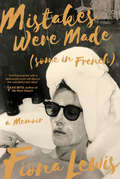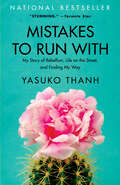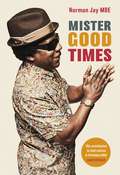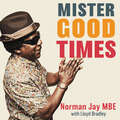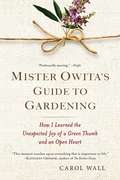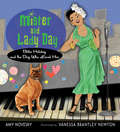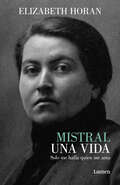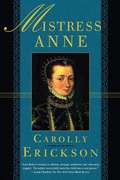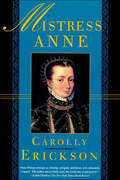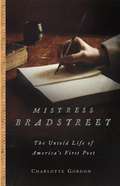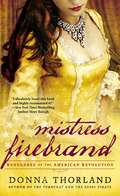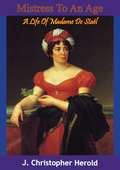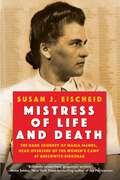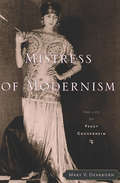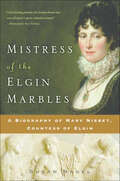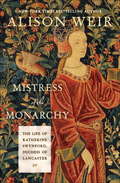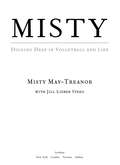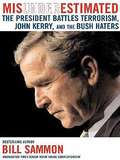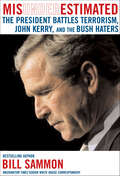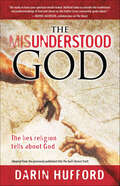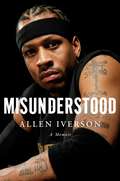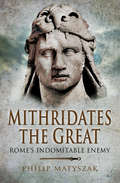- Table View
- List View
Mistakes Were Made (Some in French): A Memoir
by Fiona LewisMistakes Were Made is a revealing memoir and unexpected love story from model and actress Fiona Lewis about her journey to self-acceptance as she restores a crumbling French chateau. Alone in the French countryside, Lewis reflects on her glamorous youth across London and Paris in the ’60s, Hollywood in the ’70s, and the important, sometimes disastrous, choices she made along the way.Having lived a perfectly satisfactory life in California for over two decades, Fiona Lewis wakes up one day in her fifties and asks herself, Is this it? Is this the existence I’m meant to have? She can hardly complain. After all, her life has been full of adventure and privilege: London and Paris in the ’60s, Los Angeles in the heady ’70s. Now, however, she feels lost, as if she were slipping backward over the edge of a ravine, abandoned not only by her old self, but by that reliable standby, optimism. Realizing she has to find a way to reinvent herself, she impulsively buys a rundown chateau in the South of France. (Her husband is not pleased.) Alone in the depths of the countryside, she contemplates her childhood, her affairs––Roman Polanski, Roger Vadim––her years as an actress in some good and some questionable films, and her first Hollywood marriage to the damaged son of a movie star. As the renovation drags on, fighting with a band of impossible French workmen, she is forced to battle her own fears: her failure to become a real success, her inability to have children, and her persistent fear of aging. And she has to contend with her husband, who has no interest in the French countryside. In fact, he resents her obsession with France, with the house, with the renovations. The house seems to have a hold over her, and he’s not wrong. He reluctantly visits and is annoyed by the cost of the renovation. Was she not content with him in LA? Why can’t she just be happy? It’s an age-old question and one every woman must confront, along with aging, lost love, and missed opportunities. Yet, Fiona’s wit and wisdom prevail. And this provocative, brave memoir takes a stunning turn when all those unanswered questions develop into a tender and unexpected romance.
Mistakes to Run With: A Memoir
by Yasuko ThanhA devastatingly frank memoir that tears open the past to examine how circumstances--and the choices we make--dictate the people we become.Mistakes to Run With chronicles the turbulent life of Yasuko Thanh, from early childhood in the closest thing Victoria, BC, has to a slum to teen years as a sex worker and, finally, to her emergence as an award-winning author. As a child, Thanh embraced evangelical religion, only to rebel against it and her equally rigid parents, cutting herself, smoking, and shoplifting. At fifteen, the honour-roll runaway develops a taste for drugs and alcohol. After a stint in jail at sixteen, feeling utterly abandoned by her family, school, and society, Thanh meets the man who would become her pimp and falls in love.The next chapter of her life takes Thanh to the streets of Vancouver, where she endures beatings, arrests, crack cocaine, and an unwanted pregnancy. The act of writing ultimately becomes a solace from her suffering. Leaving the sex trade, but refusing to settle on any one thing, Thanh forges a new life for herself, from dealing drugs in four languages to motherhood and a complicated marriage, and emerges as a successful writer. But even as publication and awards bolster her, she remains haunted by her past.
Mistakes to Run With: A Memoir
by Yasuko ThanhNATIONAL BESTSELLER&“On rare occasions, you read a book that gives you the sense it had to be written, that the impulse to get these words on the page was more about necessity than choice. Books such as those are full of passion, pain and urgency, and offer the kind of triumph you feel lucky to witness. Mistakes to Run With is one such book—it feels driven by the compulsion to document, by the urgent human desire to be heard. And when every detail has been shared, every unvarnished truth thoughtfully relayed, Thanh makes you want to stand up and cheer the accomplishment.&” —The Globe and Mail &“Bold, brave, and engrossing. . . . Thanh&’s survival is story of sheer will and one that will keep you riveted to the page.&” —Vancouver SunIn her extraordinary and inspiring memoir, Yasuko Thanh, once a teenager living on the street manipulated into sex work and now an award-winning author, chronicles her path from trauma and addiction to finding her voice and finding her way. Mistakes to Run With chronicles the turbulent life of Yasuko Thanh, from early childhood in the closest thing Victoria, BC, has to a slum to teen years as a sex worker and, finally, to her emergence as an award-winning author. As a child, Thanh embraced evangelical religion, only to rebel against it and her equally rigid parents, cutting herself, smoking, and shoplifting. At fifteen, the honour-roll runaway develops a taste for drugs and alcohol. After a stint in jail at sixteen, feeling utterly abandoned by her family, school, and society, Thanh meets the man who would become her pimp and falls in love.The next chapter of her life takes Thanh to the streets of Vancouver, where she endures beatings, arrests, crack cocaine, and an unwanted pregnancy. The act of writing ultimately becomes a solace from her suffering. Leaving the sex trade, but refusing to settle on any one thing, Thanh forges a new life for herself, from dealing drugs in four languages to motherhood and a complicated marriage, and emerges as a successful writer. But even as publication and awards bolster her, she remains haunted by her past.
Mister Good Times
by Norman JayTHE LIFE STORY OF THE LEGENDARY BRITISH DJ, NORMAN JAY MBE 'Full of the heart and spirit Norman Jay brings to his music, but it also offers a salutary account of growing up as part of the Windrush generation in London's Notting Hill, the violence and racism he faced, and his success' ObserverMister Good Times is the enthralling story of a black kid growing up in a (largely white) working class world; of vivid, often violent experiences on the football terraces; of the emerging club scene growing out of a melting pot of styles; of how Jay, with his contemporaries, took the music of Black America, gave it a distinctly London twist, and used the marriage of styles to forge a hugely successful career as a trailblazing DJ and broadcaster, becoming an inspiration to a whole generation of dance music fans, black and white, without ever compromising his integrity.Along the way are tales of adventures across the country following Spurs; of Northern Soul nights, warehouse parties and illegal raves; of sound systems, the good and bad times of the Notting Hill carnival, the heady days of pirate radio, Rare Groove and the burgeoning British dance music scene.Mister Good Times is the story of a man who has lived his life on his own terms, helping to define a new British culture.
Mister Good Times
by Norman JayTHE ENTHRALLING LIFE STORY OF THE LEGENDARY DJ, NORMAN JAY MBE 'Norman Jay's contribution to club culture is immeasurable . . . He brought new life to undiscovered classics and in doing so turned on a whole new generation' David Rodigan'Full of the heart and spirit Norman Jay brings to his music, but it also offers a salutary account of growing up as part of the Windrush generation in London's Notting Hill, the violence and racism he faced, and his success' ObserverMister Good Times is the enthralling story of a black kid growing up in a (largely white) working class world; of vivid, often violent experiences on the football terraces; of the emerging club scene growing out of a melting pot of styles; of how Jay, with his contemporaries, took the music of Black America, gave it a distinctly London twist, and used the marriage of styles to forge a hugely successful career as a trailblazing DJ and broadcaster, becoming an inspiration to a whole generation of dance music fans, black and white, without ever compromising his integrity.Along the way are tales of adventures across the country following Spurs; of Northern Soul nights, warehouse parties and illegal raves; of sound systems, the good and bad times of the Notting Hill carnival, the heady days of pirate radio, Rare Groove and the burgeoning British dance music scene.Mister Good Times is the story of a man who has lived his life on his own terms, helping to define a new British culture.
Mister Owita's Guide to Gardening
by Carol WallA moving true story of the unlikely friendship between two people who had nothing and ultimately everything in common. Carol Wall was at a crossroads. Her children had flown the nest, her beloved parents were ageing and she had overcome a serious illness. A neglected garden should have been the least of her worries. Until one day she sees a man working in her neighbour's garden and realises he is responsible for its spectacular transformation. His name is Giles Owita. He comes from Kenya and he's very good at gardening. 'It was kismet. a And while I knew from the moment I met him that he was something special - truly, I didn't know the half of it. ' Before long Mister Owita is transforming not only Carol's garden, but her life. Although they seem to have nothing in common, a bond grows between them. When both are forced to share long-buried secrets, their friendship is transformed forever. This is the story of a woman who at mid-life finds there is so much more to learn and a man whose grace in facing life's challenges is a lesson for us all. 'Deeply personal, poetic and brimming with humanity, this is a book of lasting grace. ' Steve Lopez, New York Times bestselling author of The Soloist '
Mister Owita's Guide to Gardening
by Carol Wall"In this profoundly moving memoir, Owita teaches Wall how to find grace amid heartbreak and to accept that beauty exists because it is fleeting--as in her garden, as in life." --People, 4 stars"A perfect spring awakening." --Good HousekeepingA true story of a unique friendship between two people who had nothing--and ultimately everything--in common.Carol Wall, a white woman living in a lily-white neighborhood in Middle America, was at a crossroads in her life. Her children were grown; she had successfully overcome illness; her beloved parents were getting older. One day she notices a dark-skinned African man tending her neighbor's yard. His name is Giles Owita. He bags groceries at the supermarket. He comes from Kenya. And he's very good at gardening. Before long Giles is transforming not only Carol's yard, but her life. Though they are seemingly quite different, a caring bond grows between them. But they both hold long-buried secrets that, when revealed, will cement their friendship forever.er.
Mister and Lady Day: Billie Holiday and the Dog Who Loved Her
by Vanessa Brantley Newton Amy NoveskyBillie Holiday—also known as Lady Day—had fame, style, a stellar voice, big gardenias in her hair, and lots of dogs. She had a coat-pocket poodle, a beagle, Chihuahuas, a Great Dane, and more, but her favorite was a boxer named Mister. Mister was always there to bolster her courage through good times and bad, even before her legendary appearance at New York’s Carnegie Hall. Newton’s stylish illustrations keep the simply told story focused on the loving bond between Billie Holiday and her treasured boxer. An author’s note deals more directly with the singer’s troubled life, and includes a little-known photo of Mister and Lady Day!
Mistral, una vida: Solo me halla quien me ama
by Elizabeth HoranHoran revisa exhaustiva y críticamente los primeros treinta años de vida de una de las poetas esenciales de la lengua castellana. Mistral. Solo me halla quien me ama revisa exhaustiva y críticamente los primeros treinta años de vida de una de las poetas esenciales de la lengua castellana. Elizabeth Horan, reconocida especialista mundial en la poeta, reconstruye los pasos de la Premio Nobel en base a años de estudio y a la lúcida revisión del archivo mistraliano, donde una impresionante correspondencia le permite apreciar las errancias, dolores y pasiones de la poeta, pero sobre todo su carácter sinigual. Porque Mistral en estas páginas se revela ante todo como una férrea voluntad, como alguien que supo moverse con astucia y firmeza en un mundo adverso para llegar a ser quien se propuso. Su infancia en Elqui, sus afectos y alianzas clave, sus años como profesora en distintas ciudades de Chile, su relación íntima con Laura Rodig, su temprano contacto con Neruda y otros destacados escritores y políticos chilenos y sus vínculos con Argentina son expuestos con detalle en este libro -primera parte de un proyecto colosal pensado en tres tomos- hasta el momento en que la poeta abandona el país rumbo a México en 1922. Son los entrañables años de formación de una figura intelectual irreductible y siempre asombrosa.
Mistress Anne
by Carolly EricksonAs Maureen Quilligan wrote in the New York Times Book Review of "The First Elizabeth", Anne Boleyn "was a real victim of the sexual scandals her brilliant daughter escaped, and a subject Ms. Erickson's sensitivity to sexual and political nuance should well serve". Indeed, Carolly Erickson could have chosen no more fascinating and appropriate a subject. Alluring and profoundly enigmatic, Anne Boleyn has eluded the grasp of historians for centuries. Through her extraordinarily vivid re-creation of this most tragic chapter in all Tudor History, Carrolly Erickson gives us unprecedented insight into the singularity of Anne Boleyn's life, the dark and overwhelming forces that shaped her errant destiny, and the rare, tumultuous times in which she lived.
Mistress Anne
by Carolly EricksonAs Maureen Quilligan wrote in the New York Times Book Review of The First Elizabeth, Anne Boleyn "was a real victim of the sexual scandals her brilliant daughter escaped, and a subject Ms. Erickson's sensitivity to sexual and political nuance should well serve." Indeed, Carolly Erickson could have chosen no more fascinating and appropriate a subject. Alluring and profoundly enigmatic, Anne Boleyn has eluded the grasp of historians for centuries.Through her extraordinarily vivid re-creation of this most tragic chapter in all Tudor History, Carrolly Erickson gives us unprecedented insight into the singuarlity of Anne Boleyn's life, the dark and overwhelming forces that shaped her errant destiny, and the rare, tumultuous times in which she lived.
Mistress Bradstreet: The Untold Life of America's First Poet
by Charlotte GordonDESCRIPTION: An illuminating biography of Anne Bradstreet, the first writer--and the first bestseller--to emerge from the wilderness of the New World. Puritan Anne Bradstreet arrived in Massachusetts in 1630, 18 years old and newly married to Simon Bradstreet, the son of a minister. She was accompanied by her imperious father, Thomas Dudley, and a powerful clutch of Protestant dissenters whose descendants would become the founding fathers of the country. Bradstreet+s story is a rich one, filled with drama and surprises, among them a passionate marriage, intellectual ferment, religious schisms, mortal illness, and Indian massacres. This is the story of a young woman and poet of great feeling struggling to unearth a language to describe the country in which she finds herself. And it also offers a rich and complex portrait of early America, the Puritans, and their trials and values; a legacy that continues to shape our country to the present day.
Mistress Firebrand
by Donna ThorlandBritish Occupied Manhattan, 1777. With her witty comedies, American actress Jennifer Leighton has been packing the John Street Theater, but she longs to escape the provincial circuit for the glamour of the London stage. When the playwright General John Burgoyne visits the city, fresh from a recent success in the capitol, she seizes the opportunity to court his patronage. But her plan is foiled by British intelligence officer Severin Devere. Severin's mission is to keep the pleasure-loving general focused on the war effort...and away from pretty young actresses. But the tables are turned when Severin himself can't resist Jennifer Leighton...Months later, Jenny has abandoned her dreams of stage glory and begun writing seditious plays for the Rebels under the pen name "Cornelia," ridiculing "Gentleman Johnny" Burgoyne and his army--and undermining the crown's campaign to take Albany. By the time Severin meets up with Jenny once again, she is on a British hanging list, and Severin is ordered to find her--and deliver her to certain death. Soon, the two are launched on a desperate journey through the wilderness, toward a future shaped by the revolution--and their passion for each other...READERS GUIDE INCLUDED
Mistress To An Age: A Life Of Madame De Staël
by J. Christopher HeroldJ. Christopher Herold vigorously tells the story of the fierce Madame de Stael, revealing her courageous opposition to Napoleon, her whirlwind affairs with the great intellectuals of her day, and her idealistic rebellion against all that was cynical, tyrannical, and passionless. Germaine de Stael's father was Jacques Necker, the finance minister to Louis XVI, and her mother ran an influential literary-political salon in Paris. Always precocious, at nineteen Germaine married the Swedish ambassador to France, Eric Magnus Baron de Stael-Holstein, and in 1785 took over her mother's salon with great success. Germaine and de Stael lived most of their married life apart. She had many brilliant lovers. Talleyrand was the first, Narbonne, the minister of war, another; Benjamin Constant was her most significant and long-lasting one. She published several political and literary essays, including "A Treatise on the Influence of the Passions upon the Happiness of Individuals and of Nations, " which became oneof the most important documents of European Romanticism. Her bold philosophical ideas, particularly those in "On Literature, " caused feverish commotion in France and were quickly noticed by Napoleon, who saw her salon as a rallying point for the opposition. He eventually exiled her from France.<P><P> Winner of the 1959 National Book Award
Mistress of Life and Death: The Dark Journey of Maria Mandl, Head Overseer of the Women's Camp at Auschwitz-Birkenau
by Susan J. EischeidA gripping, unflinching biography of SS Overseer Maria Mandl, one of the most notorious and contradictory figures at the heart of the Nazi regime, and her transformation from harmless small-town girl to hardened killer. With new details and previously unpublished photographs, this gripping, unflinching examination charts her transformation from engaging country girl to &“The Beast&” of Auschwitz. By the time of her execution at thirty-six, Maria Mandl had achieved the highest rank possible for a woman in the Third Reich. As Head Overseer of the women&’s camp at Auschwitz-Birkenau, she was personally responsible for the murders of thousands, and for the torture and suffering of countless more. In this riveting biography, Susan J. Eischeid explores how Maria Mandl, regarded locally as &“a nice girl from a good family,&” came to embody the very worst of humanity. Born in 1912 in the scenic Austrian village of Münzkirchen, Maria enjoyed a happy childhood with loving parents—who later watched in anguish as their grown daughter rose through the Nazi system. Mandl&’s life mirrors the period in which she lived: turbulent, violent, and suffused with paradoxes. At Auschwitz-Birkenau, she founded the notable women&’s orchestra and &“adopted&” several children from the transports—only to lead them to the gas chambers when her interest waned. After the war, Maria was arrested for crimes against humanity. Following a public trial attended by the international press, she was hanged in 1948. For two decades, Eischeid has excavated the details of Mandl&’s life story, drawing on archival testimonies, speaking to dozens of witnesses, and spending time with Mandl&’s community of friends and neighbors who shared their memories as well as those handed down in their families. The result is a chilling and complex exploration of how easily an ordinary citizen chose the path of evil in a climate of hate and fear.
Mistress of Modernism: The Life of Peggy Guggenheim
by Mary V. DearbornThe life story of the bohemian socialite who rebelled against her famous family and became a renowned art collector. Peggy Guggenheim was the ultimate self-invented woman, a cultural mover and shaker who broke away from her poor-little-rich-girl origins to shape a life for herself as the enfant terrible of the art world. Her visionary Art of This Century gallery in New York, which brought together the European surrealist artists with the American abstract expressionists, was an epoch-shaking &“happening&” at the center of its time. In Mistress of Modernism, Mary V. Dearborn draws upon her unprecedented access to the Guggenheim family, friends, and papers to craft a &“thorough biography . . . [that] will appeal to art lovers interested in more than the paint&” (Publishers Weekly). &“With drive and clarity, Dearborn charts Guggenheim&’s peripatetic life,&” offering rich insight into Peggy&’s traumatic childhood in German-Jewish &“Our Crowd&” New York, her self-education in the ways of art and artists, her caustic battles with other art-collecting Guggenheims, and her legendary sexual appetites (her lovers included Max Ernst, Samuel Beckett, and Marcel Duchamp, to name just a few) (Booklist). Here too is a poignant portrait of Peggy&’s last years as l&’ultima dogaressa—the last (female) doge—in her palazzo in Venice, where her collection still draws thousands of visitors every year. Mistress of Modernism is the first definitive biography of Peggy Guggenheim, whose wit, passion, and provocative legacy Dearborn brings compellingly to life.
Mistress of the Elgin Marbles: A Biography of Mary Nisbet, Countess of Elgin
by Susan Nagel“A lively and welcome account of a charismatic woman,” drawing on the personal correspondence of Lady Mary Bruce, wife of the Earl of Elgin (People).The remarkable Mary Nisbet was the Countess of Elgin in Romantic-era Scotland and the wife of the seventh Earl of Elgin. When Mary accompanied her husband to diplomatic duty in Turkey, she changed history. She helped bring the smallpox vaccine to the Middle East, struck a seemingly impossible deal with Napoleon, and arranged the removal of famous marbles from the Parthenon. But all of her accomplishments would be overshadowed, however, by her scandalous divorce. Drawing from Mary’s own letters, scholar Susan Nagel tells Mary’s enthralling, inspiring, and suspenseful story in vibrant detail.“Absorbing . . . required reading for anyone interested in cultural history, as well as the art of biography.” —Booklist“A sympathetic and emotionally charged portrait . . . [written] with insight and compassion yet without sentimentality.” —Publishers Weekly“A unique life related with animation, admiration, and affection.” —Kirkus Reviews
Mistress of the Monarchy: The Life of Katherine Swynford, Duchess of Lancaster
by Alison WeirBONUS: This edition contains a reader's guide and an excerpt from Allison Weir's The Lady in the Tower.Acclaimed author Alison Weir brings to life the extraordinary tale of Katherine Swynford, a royal mistress who became one of the most crucial figures in the history of Great Britain. Born in the mid-fourteenth century, Katherine de Roët was only twelve when she married Hugh Swynford, an impoverished knight. But her story had truly begun two years earlier, when she was appointed governess to the household of John of Gaunt, Duke of Lancaster and fourth son of King Edward III. Widowed at twenty-one, Katherine became John's mistress and then, after many twists of fortune, his bride in a scandalous marriage. Mistress of the Monarchy reveals a woman ahead of her time--making her own choices, flouting convention, and taking control of her own destiny. Indeed, without Katherine Swynford, the course of English history, perhaps even the world, would have been very different.NOTE: This edition does not contain illustrations.
Misty
by Misty May-Treanor Jill Lieber SteegThe passionate, poignant, and triumphant story of two-time Olympic gold medal-winning beach volleyball icon Misty May-Treanor.More than any Olympics in history, the 2008 Beijing Summer Games captured the world's imagination, and Misty May-Treanor became one of the biggest U.S. stars on the global stage. Now she shares the story of her life and remarkable athletic career.Destined for beach volleyball superstardom, having been raised on famed Muscle Beach in Santa Monica, California, Misty talks about the personal and professional challenges she has faced and the life lessons she has learned in the process. From growing up with two driven, competitive, accomplished athlete parents and living in a volatile household rocked for years by their alcoholism to the heartbreaking death of her mother from cancer, Misty reveals intimate details never before publicly discussed. She tells behind-the-scenes stories about her eight-year climb to the top of beach volleyball with partners Holly McPeak and Kerri Walsh; her career-threatening injuries; her role on ABC's hit television show Dancing with the Stars; and of course, her historic two Olympic gold medals and the special rewards they've brought. Offering an unprecedented glimpse into the life of a cherished celebrity sports icon and an ambassador for women's athletics, Misty will touch, inspire, and empower readers everywhere.
Misunderestimated: The President Battles Terrorism, John Kerry, and the Bush Haters
by Bill SammonConservative political analyst offers his opinions on the Bush presidency with a focus on foreign policy. Includes exclusive interviews with the president and his advisers.
Misunderestimated: The President Battles Terrorism, John Kerry, and the Bush Haters
by Bill SammonA riveting portrait of President Bush as he broadens the war on terror overseas—and plunges into high-stakes political battles at home"They misunderestimated me," George W. Bush famously remarked on the eve of his historic presidency. Fractured syntax aside, Bush was right: his detractors misunderstood his appeal to the American public, and underestimated his considerable political skills. In this compelling new book, Bill Sammon reveals how the president is turning these misperceptions to his advantage in the looming showdown with John Kerry and the Bush haters.As senior White House correspondent for the Washington Times, Sammon has been granted extraordinary access to the president and his closest confidants, from political gurus Karl Rove and Andy Card to foreign policy advisers Colin Powell and Condoleezza Rice. The result is a compelling chronicle of the second eighteen months of George W. Bush's term, as the administration's focus shifts from al Qaeda and Afghanistan to Iraq and the 2004 election. Sammon's on-the-scene reporting and exclusive interviews with the president and his top advisers reveal how the White House is implementing the most profound shift in U.S. foreign policy in more than half a century, prompting an eminent Democratic historian to rank Bush alongside John Quincy Adams and Franklin Delano Roosevelt as one of America's "grand" strategists.For the first time, Sammon discloses the president's vow that Kerry will "regret" bad-mouthing the liberation of Iraq, the seminal event in the post-9/11 phase of the Bush presidency. Rove even details for Sammon the White House strategy to paint Kerry as a condescending elitist whose "blatant" attempts to capitalize on his Vietnam experience will ultimately come back to haunt him.Misunderestimated also meticulously tracks the rise of the Bush haters, a disturbing political phenomenon that colors everything from the war on terrorism to the presidential campaign. The impact extends to the press, which Sammon exposes for racing to brand Operation Iraqi Freedom another Vietnam "quagmire" less than eighteen months after making the same blunder during the Afghan war.In Misunderestimated, Sammon takes readers inside the Oval Office for historic decisions of war and peace, aboard Air Force One for a daring, surprise descent into Baghdad, and even on an intimate tour of Bush's beloved Prairie Chapel Ranch in Crawford, Texas. It's a mesmerizing account of a president determined not to repeat his father's two fundamental mistakes—abandoning Iraq and failing to vanquish the Democrats.
Misunderstood God: The Lies Religion Tells About God
by Darin HuffordThe Misunderstood God tells the truth about who the Creator is. This book analyzes what religion says about God's heart and personality and measures it up to what God calls Himself: Love. It simplifies a generation's tangled perceptions of God by taking a journey through the sixteen aspects of love described in one of the most well-known Bible passages in the world: 1 Corinthians 13, also known as "the love chapter." So many Christians have been bombarded with confusing teachings and doctrines that their understanding of God resembles a tightly tangled ball of Christmas tree lights. This book takes that twisted mess and replaces it with one soft, warm light of truth that anyone can embrace: God is love.
Misunderstood: A Memoir
by Allen IversonA compelling and candid memoir from Allen Iverson, the NBA&’s most misunderstood Hall of Famer, detailing his tough childhood in Virginia, his entry into the league as the number one overall pick, and his controversial, culture-changing pro basketball career. In Misunderstood, Allen Iverson shares in searing clarity and touching candor his meteoric rise from impoverished child in the Virginia projects to high school champion to Georgetown University protégé of legendary coach John Thompson, and finally to NBA All-Star and Reebok&’s Vice President of Basketball. Allen Iverson is a household name—Boomers and Gen Xers watched his decades-long run as a scrappy, tenacious basketball player on the Philadelphia 76ers who redefined the sport&’s style (both fashion-wise and playing-wise), while millennials and Gen Zers are perhaps more familiar with his Reebok line&’s resurgence in popularity, his callout in Post Malone&’s viral hit &“White Iverson,&” and for being the namesake of Kendall Roy&’s son on Succession. Part athletic legend, part fashion icon, part hip-hop muse, Iverson was one of the first celebrities to fuse lifestyle, culture, and sports. But while everyone may know his name, few have seen behind the curtain on Iverson&’s tumultuous life. Misunderstood lifts the veil and brings you into the mind of the pugnacious, ultra-talented misfit whose foremost goal, more than fame or fortune, was always to lift his family and friends out of poverty and violence. In his memoir, Iverson explores how he completely shattered the mold dictating what an NBA star could be in the 1990s and 2000s, all while dealing with legal troubles and personal traumas that only contributed to his sense of individualism and star power. This is the unforgettable story of a trailblazer who not only changed the game of basketball but rewrote the rules of what it means to rise, fall, and rise again while staying unapologetically true to himself.
Mithridates the Great: Rome's Indomitable Enemy
by Philip MatyszakA military biography of Mithridates VI the Great of Pontus, Romes most persistent enemy. The Mithridiatic wars stretched over half a century and two continents, and have a fascinating cast of pirates, rebels, turncoats and poisoners (though an unfortunate lack of heroes with untarnished motives). There are pitched battles, epic sieges, double-crosses and world-class political conniving, assassinations and general treachery. Through it all, the story is built about the dominant character of Mithridates, connoisseur of poisons, arch-schemer and strategist; resilient in defeat, savage and vindictive in victory. Almost by definition, this book will break new ground, in that nothing has been written on Mithridates for the general public for almost half a century, though scholarly journals have been adding a steady trickle of new evidence, which is drawn upon here. Few enough leaders went to war with Rome and lived long to tell the tale, but in the first half of the first century BC, Mithridates did so three times. At the high point of his career his armies swept the Romans out of Asia Minor and Greece, reversing a century of Roman expansion in the region. Even once fortune had turned against him he would not submit. Upto the day he died, a fugitive drive to suicide by the treachery of his own son, he was still planning an overland invasion of Roman itself.
